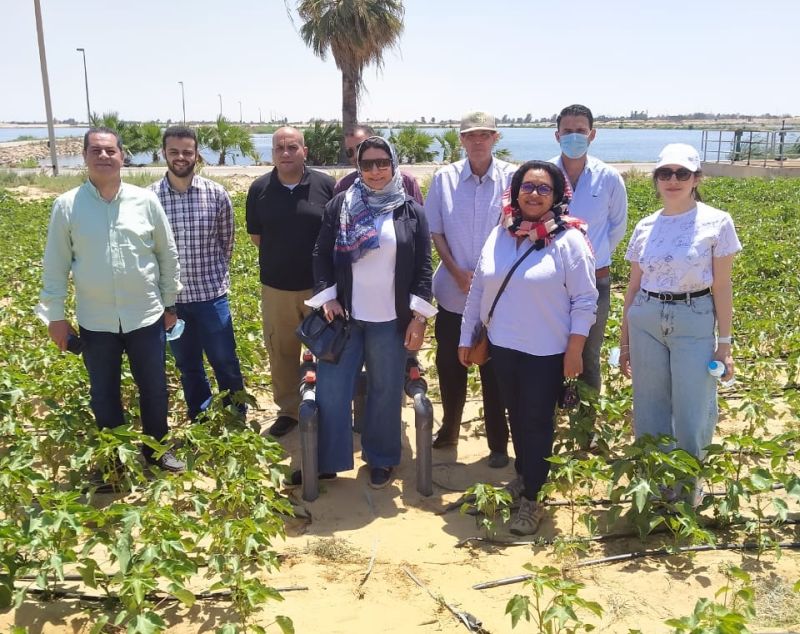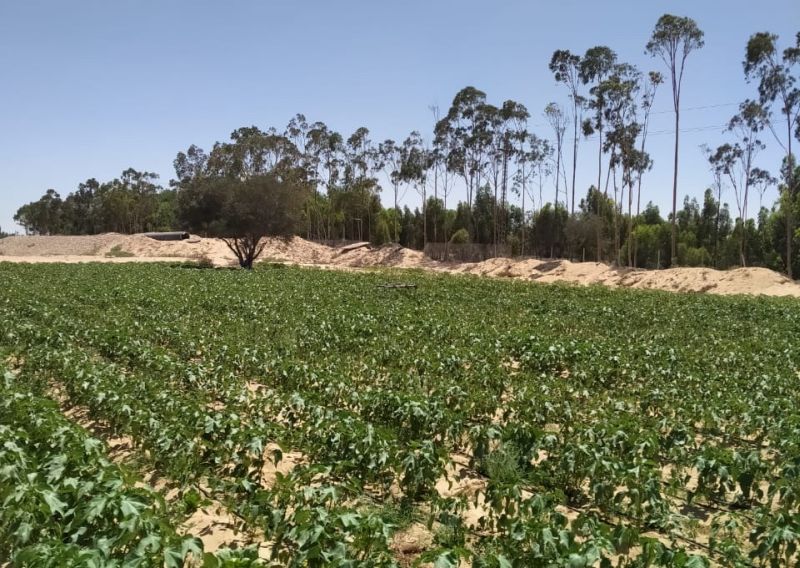Sarapium Wastewater Treatment Plant (WWTP) Field Visit in Ismailia, Egypt

On 23rd of May 2021, IWMI's ReWater MENA project team, accompanied by colleagues from the International Center for Agricultural Research in the Dry Areas (ICARDA), conducted a field visit to Sarapium Wastewater Treatment Plant (WWTP) in Ismailia to follow up on the activities implemented in the experimental site for feasible water reuse solutions at the site. The project tends to expand the treated wastewater reuse directly and indirectly in the region by developing reuse models and national plans for the safe use of treated wastewater in Egypt. In this regard, the project highlights the several potential benefits of applying wastewater management practices including recovery and safe reuse of this available and sustainable source of water. Moreover, the project seeks to optimize the potential contribution of such valuable unconventional water sources to meet the country's water needs in a sustainable manner taking into consideration the socio-economic developments and environmental protection.
The team visited Sarapium site, which is managed by Ain Shams University that has been implementing several experiments collaboratively with other programs for many years to establish a sustainable forestay in desert lands of Egypt using treated wastewater to support the Egyptian afforestation program. In collaboration with Ain Shams University, ICARDA, one of the implementing partners of ReWater MENA, successfully established the experimental site after signing a Memorandum of Agreement with the University to use the site for implementing the planned activities under ReWater MENA Project. The experimental site is divided into plots, area of each plot is estimated to one Feddan (4200 m2), to conduct adaptive research on selected crops (wheat, barley, and cotton) using on-farm best practices, including intercropping with already established trees in the site; use of different irrigation intervals and fertilizer regimes; and assessment of soil health in terms of Nitrogen, Phosphorus, and Potassium (N, P, and K) and salinity as well.
In other words, the experimental site investigates the impact of direct reuse of treated wastewater on the selected crops and soil. Specifically, the experiment will identify the most suitable technique that increases the yield and quality of different crops; it will estimate the water use efficiency for the different crops and identify the most appropriate irrigation system. Eventually, it will investigate the impact of mycorrhiza on the growth of the different crops. The hypothesis of using the mycorrhiza is that the use of endomycorrhizae in conjunction with pseudomonas putida in irrigation water will serve as chemical fertilizer and pesticide, reduce the effect of heavy metal on the plants and provide beneficial micro-organisms that improve soil fertility and quality.

ICARDA conducted soil analysis for the experimental site and it was found that the soil texture in the site is sandy. The collected data regarding the quality of treated wastewater from Sarapium WWTP show that the quality of water is grade (C) which can be used to irrigate dry grains such as wheat, barley, and cotton according to the Egyptian code 501/2015. Raised bed and drip irrigation networks were established to cultivate wheat, barley, and cotton. The experiment takes into consideration the same crops planted at the same time and irrigated by fresh water as control treatment to compare the results.
In the first experiment (winter season), the plots were planted with improved varieties wheat and barley in 23rd of November 2020. Types of seeds used are Giza 171 and Giza 123 for wheat and barley respectively, the plots consumed around 55 and 60 Kgs of seeds for wheat and barley respectively and the seeds were secured from the national Agricultural Research Center (ARC). The fields were monitored regularly and required data were gathered periodically. After 22 days of plantation, wheat and barley plantations grew very well and the average height of the plantations was 20 cm for wheat and 25 cm for barley.
In 16th December 2020, each plot was divided equally (half Feddan each). One part was inoculated with a mixture of microbial inoculants (2 liters endomycorrhizae and 20 liters pseudomonas putida) to test the impact of mycorrhiza on the wheat and barley growth. The microbial inoculants were injected in the drip irrigation system during the last 15 minutes of the irrigation period while; the other parts of wheat and barley (control) were left irrigated by treated wastewater only.
Microbial inoculants serve as alternatives to chemical fertilizers and pesticides. It comprises beneficial micro-organisms that improve soil fertility and quality. The mixture of microbial inoculants was used mainly to reduce the harmful effect of heavy metals present in the low-quality water; the inoculant absorbs heavy metals from the water and prevents its transfer to plants, and improves the tolerance of plants to harmful factors. The microbial inoculant also increases the immune resistance of plants and improves overall plant growth and yield. Overall, the plots responded very well during the entire season and the impact of mycorrhiza was 15% higher on yield compared to control plots of wheat and barley that were irrigated by treated wastewater only.
Currently, ICARDA is carrying out the second experiment (summer season), an area of 0.75 Feddan (3150 m2) is planted with cotton and it is responding very well to the same practices of the previous season. The results will also be compared to the control fields that are cultivated with cotton and irrigated by freshwater. The summer season of wheat and barley is expected to be repeated in the next phase emphasize the result compared to the results of the first phase. Finally, the results could promote and disseminate treated wastewater reuse in irrigation of certain types of crops in Egypt and The MENA Region and thus, increase sustainability of water resources, economic efficiency and environmental protection.
